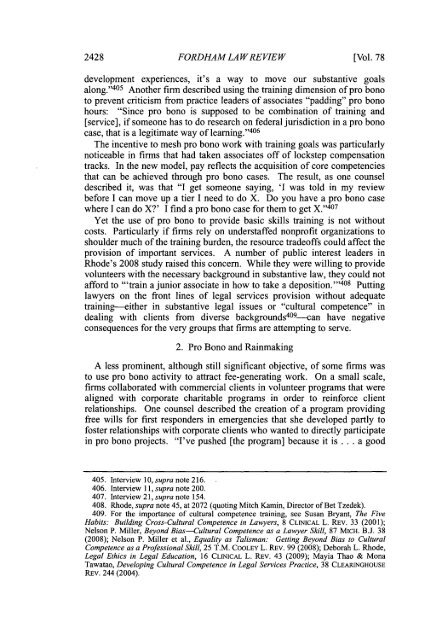Law for The Poor
Law for The Poor
Law for The Poor
You also want an ePaper? Increase the reach of your titles
YUMPU automatically turns print PDFs into web optimized ePapers that Google loves.
2428 FORDHAM LAWREVIEW<br />
[Vol. 78<br />
development experiences, it's a way to move our substantive goals<br />
along." 40 5 Another firm described using the training dimension of pro bono<br />
to prevent criticism from practice leaders of associates "padding" pro bono<br />
hours: "Since pro bono is supposed to be combination of training and<br />
[service], if someone has to do research on federal jurisdiction in a pro bono<br />
case, that is a legitimate way of learning. '40 6<br />
<strong>The</strong> incentive to mesh pro bono work with training goals was particularly<br />
noticeable in firms that had taken associates off of lockstep compensation<br />
tracks. In the new model, pay reflects the acquisition of core competencies<br />
that can be achieved through pro bono cases. <strong>The</strong> result, as one counsel<br />
described it, was that "I get someone saying, 'I was told in my review<br />
be<strong>for</strong>e I can move up a tier I need to do X. Do you have a pro bono case<br />
where I can do X?' I find a pro bono case <strong>for</strong> them to get X." '4 0 7<br />
Yet the use of pro bono to provide basic skills training is not without<br />
costs. Particularly if firms rely on understaffed nonprofit organizations to<br />
shoulder much of the training burden, the resource tradeoffs could affect the<br />
provision of important services. A number of public interest leaders in<br />
Rhode's 2008 study raised this concern. While they were willing to provide<br />
volunteers with the necessary background in substantive law, they could not<br />
af<strong>for</strong>d to<br />
40<br />
"'train a junior associate in how to take a deposition.'<br />
8<br />
Putting<br />
lawyers on the front lines of legal services provision without adequate<br />
training-either in substantive legal issues or "cultural competence" in<br />
dealing with clients from diverse backgrounds 4 9 -- can have negative<br />
consequences <strong>for</strong> the very groups that firms are attempting to serve.<br />
2. Pro Bono and Rainmaking<br />
A less prominent, although still significant objective, of some firms was<br />
to use pro bono activity to attract fee-generating work. On a small scale,<br />
firms collaborated with commercial clients in volunteer programs that were<br />
aligned with corporate charitable programs in order to rein<strong>for</strong>ce client<br />
relationships. One counsel described the creation of a program providing<br />
free wills <strong>for</strong> first responders in emergencies that she developed partly to<br />
foster relationships with corporate clients who wanted to directly participate<br />
in pro bono projects. "I've pushed [the program] because it is ... a good<br />
405. Interview 10, supra note 216.<br />
406. Interview 11, supra note 200.<br />
407. Interview 21, supra note 154.<br />
408. Rhode, supra note 45, at 2072 (quoting Mitch Kamin, Director of Bet Tzedek).<br />
409. For the importance of cultural competence training, see Susan Bryant, <strong>The</strong> Five<br />
Habits: Building Cross-Cultural Competence in <strong>Law</strong>yers, 8 CLINICAL L. REv. 33 (2001);<br />
Nelson P. Miller, Beyond Bias-Cultural Competence as a <strong>Law</strong>yer Skill, 87 MICH. B.J. 38<br />
(2008); Nelson P. Miller et al., Equality as Talisman: Getting Beyond Bias to Cultural<br />
Competence as a Professional Skill, 25 T.M. COOLEY L. REv. 99 (2008); Deborah L. Rhode,<br />
Legal Ethics in Legal Education, 16 CLINICAL L. REv. 43 (2009); Mayia Thao & Mona<br />
Tawatao, Developing Cultural Competence in Legal Services Practice, 38 CLEARINGHOUSE<br />
REv. 244 (2004).

















